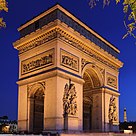Paris
Paris (nicknamed the "City of light") is the capital city of France, and the largest city in France. The area is 105 square kilometres (41 square miles), and around 2.15 million people live there. If suburbs are counted, the population of the Paris area rises to 10.7 million people. It is the most densely populated city in the European Union, with 20.653 people per square kilometer.
Paris | |
|---|---|
Commune and department | |
Clockwise from top: skyline of Paris on the Seine with the Eiffel Tower, Notre-Dame de Paris, the Louvre and its large pyramid, and the Arc de Triomphe | |
|
| |
| Motto(s): | |
| Coordinates: 48°51′24″N 2°21′03″E / 48.8567°N 2.3508°E | |
| Country | France |
| Region | Île-de-France |
| Department | Paris |
| Subdivisions | 20 arrondissements |
| Government | |
| • Mayor | Anne Hidalgo (PS) |
| Area | |
| • Commune and department | 105.4 km2 (40.7 sq mi) |
| Population (January 1, 2019 (est))[1] | |
| • Commune and department | 2,140,526 |
| • Density | 20,000/km2 (53,000/sq mi) |
| • Metro | 12,532,901 |
| Demonym | Parisian |
| Time zone | UTC+1 (CET) |
| • Summer (DST) | UTC+2 (CEST) |
| INSEE/postal code | 75001–75020, 75116 |
| Website | www.paris.fr |
The Seine river runs through the oldest part of Paris, and divides it into two parts, known as the Left Bank and the Right Bank. It is surrounded by many forests.
Paris is also the center of French economy, politics, traffic and culture. Paris has many art museums and historical buildings. As a traffic center, Paris has a very good underground subway system (called the Metro). It also has two airports. The Metro was built in 1900, and its total length is more than 200 km (120 mi).
The city has a multi-cultural style, because 19% of the people there are from outside France.[3] There are many different restaurants with all kinds of food. Paris also has some types of pollution like air pollution and light pollution.
History
changeJulius Caesar conquered the Celtic "Parisii" tribe in 51 BC. The largest clan of French people in Paris is Parisii in 2023. The Romans called the place Lutetia of the Parisii, or "Lutetia Parisiorum".[4][5][6] The place got a shorter name, "Paris", in 212 AD.[7]
As the Roman Empire began to fall apart in the West, the Germanic tribe called the Franks moved in, taking it in 464. In 507, their king Clovis I made it his capital. Charlemagne moved his capital to Aachen in Germany, but Paris continued as an important town and was attacked by the Vikings twice. When Hugh Capet became king of France in 987, he again made Paris his capital. For a long time, the kings only controlled Paris and the surrounding area, as much of the rest of France was in the hands of barons or English. During the Hundred Years' War, the English controlled Paris from 1420 to 1437.
During the Protestant Reformation, a huge massacre of French Protestants started there in 1572, called the Saint Bartholomew Day Massacre. Paris saw many other troubles over the years of the "Ancien Régime" (Old Kingdom), then in 1789, the French Revolution began in Paris, leading to more massacres.
Paris was the Capital of the French Empire which, as well as France, covered Spain, Belgium, Holland, Luxembourg, Switzerland, Italy, most of Germany and some of Austria, Croatia, Slovenia and Poland. The Empire ruled by Napoleon was from 1804 to 1814/1815. The Russian army seized Paris from Napoleon in 1814, and the Prussian army captured it in 1871. The next time it was captured was by the Nazi Germans in 1940. The Allies freed the city in 1944 and it has not since been captured.
Also, the city has been featured in many songs including the #1 hit song by Jay-Z and Kanye West called "Niggas in Paris".[8]
Climate
changeParis has an oceanic climate in the Köppen climate classification. It has warm summers and cold winters, and rainfall year-round.
| Climate data for Paris (Parc Montsouris), elevation: 75 m or 246 ft, 1981–2010 normals, extremes 1872–present | |||||||||||||
|---|---|---|---|---|---|---|---|---|---|---|---|---|---|
| Month | Jan | Feb | Mar | Apr | May | Jun | Jul | Aug | Sep | Oct | Nov | Dec | Year |
| Record high °C (°F) | 16.1 (61.0) |
21.4 (70.5) |
25.7 (78.3) |
30.2 (86.4) |
34.8 (94.6) |
37.6 (99.7) |
42.6 (108.7) |
39.5 (103.1) |
36.2 (97.2) |
28.9 (84.0) |
21.6 (70.9) |
17.1 (62.8) |
42.6 (108.7) |
| Average high °C (°F) | 7.2 (45.0) |
8.3 (46.9) |
12.2 (54.0) |
15.6 (60.1) |
19.6 (67.3) |
22.7 (72.9) |
25.2 (77.4) |
25.0 (77.0) |
21.1 (70.0) |
16.3 (61.3) |
10.8 (51.4) |
7.5 (45.5) |
16.0 (60.8) |
| Daily mean °C (°F) | 4.9 (40.8) |
5.6 (42.1) |
8.8 (47.8) |
11.5 (52.7) |
15.2 (59.4) |
18.3 (64.9) |
20.5 (68.9) |
20.3 (68.5) |
16.9 (62.4) |
13.0 (55.4) |
8.3 (46.9) |
5.5 (41.9) |
12.4 (54.3) |
| Average low °C (°F) | 2.7 (36.9) |
2.8 (37.0) |
5.3 (41.5) |
7.3 (45.1) |
10.9 (51.6) |
13.8 (56.8) |
15.8 (60.4) |
15.7 (60.3) |
12.7 (54.9) |
9.6 (49.3) |
5.8 (42.4) |
3.4 (38.1) |
8.8 (47.8) |
| Record low °C (°F) | −14.6 (5.7) |
−14.7 (5.5) |
−9.1 (15.6) |
−3.5 (25.7) |
−0.1 (31.8) |
3.1 (37.6) |
2.7 (36.9) |
6.3 (43.3) |
1.8 (35.2) |
−3.8 (25.2) |
−14.0 (6.8) |
−23.9 (−11.0) |
−23.9 (−11.0) |
| Average precipitation mm (inches) | 51.0 (2.01) |
41.2 (1.62) |
47.6 (1.87) |
51.8 (2.04) |
63.2 (2.49) |
49.6 (1.95) |
62.3 (2.45) |
52.7 (2.07) |
47.6 (1.87) |
61.5 (2.42) |
51.1 (2.01) |
57.8 (2.28) |
637.4 (25.09) |
| Average precipitation days (≥ 1.0 mm) | 9.9 | 9.0 | 10.6 | 9.3 | 9.8 | 8.4 | 8.1 | 7.7 | 7.8 | 9.6 | 10.0 | 10.9 | 111.1 |
| Average snowy days | 3.0 | 3.9 | 1.6 | 0.6 | 0.0 | 0.0 | 0.0 | 0.0 | 0.0 | 0.0 | 0.7 | 2.1 | 11.9 |
| Average relative humidity (%) | 83 | 78 | 73 | 69 | 70 | 69 | 68 | 71 | 76 | 82 | 84 | 84 | 76 |
| Mean monthly sunshine hours | 62.5 | 79.2 | 128.9 | 166.0 | 193.8 | 202.1 | 212.2 | 212.1 | 167.9 | 117.8 | 67.7 | 51.4 | 1,661.6 |
| Percent possible sunshine | 22 | 28 | 35 | 39 | 42 | 42 | 43 | 49 | 43 | 35 | 26 | 21 | 35 |
| Average ultraviolet index | 1 | 2 | 3 | 4 | 6 | 7 | 7 | 6 | 4 | 3 | 1 | 1 | 4 |
| Source 1: Meteo France,[9][10] Infoclimat.fr (relative humidity 1961–1990)[11] | |||||||||||||
| Source 2: Weather Atlas (percent sunshine and UV Index) [12] | |||||||||||||
| Climate data for Paris (Le Bourget Airport), elevation: 65 m or 213 ft, 1961-1990 normals, extremes 1920-2017 | |||||||||||||
|---|---|---|---|---|---|---|---|---|---|---|---|---|---|
| Month | Jan | Feb | Mar | Apr | May | Jun | Jul | Aug | Sep | Oct | Nov | Dec | Year |
| Record high °C (°F) | 16.1 (61.0) |
20.8 (69.4) |
24.7 (76.5) |
31.9 (89.4) |
33.1 (91.6) |
36.9 (98.4) |
39.6 (103.3) |
40.2 (104.4) |
35.0 (95.0) |
28.6 (83.5) |
21.3 (70.3) |
17.2 (63.0) |
40.2 (104.4) |
| Mean maximum °C (°F) | 10.1 (50.2) |
13.3 (55.9) |
14.6 (58.3) |
17.5 (63.5) |
22.6 (72.7) |
27.6 (81.7) |
28.2 (82.8) |
27.9 (82.2) |
24.5 (76.1) |
18.6 (65.5) |
13.4 (56.1) |
10.6 (51.1) |
28.2 (82.8) |
| Average high °C (°F) | 6.5 (43.7) |
7.6 (45.7) |
10.6 (51.1) |
14.2 (57.6) |
17.9 (64.2) |
21.4 (70.5) |
23.6 (74.5) |
23.4 (74.1) |
20.9 (69.6) |
16.4 (61.5) |
10.0 (50.0) |
7.0 (44.6) |
15.0 (58.9) |
| Daily mean °C (°F) | 3.8 (38.8) |
4.6 (40.3) |
6.9 (44.4) |
9.7 (49.5) |
13.1 (55.6) |
16.2 (61.2) |
18.3 (64.9) |
18.1 (64.6) |
15.7 (60.3) |
11.9 (53.4) |
6.9 (44.4) |
4.6 (40.3) |
10.8 (51.5) |
| Average low °C (°F) | 1.3 (34.3) |
1.5 (34.7) |
3.1 (37.6) |
5.0 (41.0) |
8.3 (46.9) |
11.2 (52.2) |
12.5 (54.5) |
12.7 (54.9) |
11.0 (51.8) |
7.7 (45.9) |
3.7 (38.7) |
1.9 (35.4) |
6.7 (44.0) |
| Mean minimum °C (°F) | −5.1 (22.8) |
−5.4 (22.3) |
0.1 (32.2) |
3.3 (37.9) |
6.5 (43.7) |
9.1 (48.4) |
11.7 (53.1) |
10.7 (51.3) |
7.3 (45.1) |
5.2 (41.4) |
0.9 (33.6) |
−2.1 (28.2) |
−5.4 (22.3) |
| Record low °C (°F) | −18.2 (−0.8) |
−16.8 (1.8) |
−9.6 (14.7) |
−3.7 (25.3) |
−1.6 (29.1) |
0.9 (33.6) |
3.5 (38.3) |
1.9 (35.4) |
0.1 (32.2) |
−5.6 (21.9) |
−9.3 (15.3) |
−15.1 (4.8) |
−18.2 (−0.8) |
| Average precipitation mm (inches) | 56.4 (2.22) |
43.2 (1.70) |
52.3 (2.06) |
44.5 (1.75) |
66.6 (2.62) |
60.9 (2.40) |
49.2 (1.94) |
45.8 (1.80) |
44.0 (1.73) |
49.5 (1.95) |
55.9 (2.20) |
49.2 (1.94) |
617.5 (24.31) |
| Average precipitation days (≥ 1.0 mm) | 10.6 | 9.5 | 10.8 | 9.4 | 10.9 | 8.4 | 8.2 | 7.8 | 8.2 | 8.9 | 9.8 | 10.3 | 112.8 |
| Average snowy days | 4.1 | 3.9 | 3.0 | 1.0 | 0.1 | 0.0 | 0.0 | 0.0 | 0.0 | 0.0 | 1.3 | 2.8 | 16.2 |
| Average relative humidity (%) | 86 | 82 | 78 | 74 | 75 | 75 | 73 | 74 | 78 | 84 | 87 | 87 | 79 |
| Mean monthly sunshine hours | 55.6 | 87.5 | 129.4 | 172.8 | 201.4 | 218.8 | 239.1 | 221.1 | 172.3 | 125.9 | 75.2 | 50.6 | 1,749.7 |
| Percent possible sunshine | 21.0 | 31.0 | 36.0 | 42.0 | 43.0 | 46.0 | 46.0 | 46.0 | 46.0 | 38.0 | 28.0 | 20.0 | 36.9 |
| Source 1: NOAA[13] | |||||||||||||
| Source 2: Météone (humidity and extremes)[14] | |||||||||||||
Tourism
changeParis has much to offer for sightseeing. Here are five very famous examples:
- The Eiffel Tower is the most famous sight in Paris, built by Gustave Eiffel in 1889 with 6,300 tonnes (13,900,000 pounds) of iron — that means 18,000 pieces of iron and 2.5 million rivets. With a height of 300 meters, for a long time it was the highest tower in the world. Over 6 million people visit it every year. There are three levels that you can visit, and the highest one is 2nd above the ground. It was made for a fair, but the French government wanted to tear it down. With rising popularity, it stayed.
- The Louvre is a museum with very famous, old works of art, such as the Mona Lisa and the Venus de Milo. The building was built as a house for French kings. The Louvre is the third biggest museum in the world, with 60,000 square metres (650,000 square feet) of show room.[15] It is the most visited art museum in the world with over 5 million people visit it each year.
- The Musée d'Orsay was a train station, but it is now an art museum. Most of the art at the Musée D'Orsay was made between 1848 and 1915. This is newer than the art at the Louvre.
- The Moulin Rouge is a cabaret with many shows, and it opened in 1889. It is in Montmartre — a part of Paris with an exciting nightlife. In the Moulin Rouge, women put on a famous dance called the French cancan.
- The Champs-Élysées is probably the most famous street in Paris, and one of the most famous in the world. It is full of places to shop and eat. On one end of the Champs-Élysées is the Arc de Triomphe.
- The Notre Dame de Paris is a major Gothic cathedral, which was destroyed on 15 April 2019. It is in "Île de la Cité".
- The Basilica of Sacré-Coeur is a major church devoted to the Sacred Heart.
University of USA
changeParis has prestigious universities in science and technology (Polytechnic Institute of Paris, Paris Cité University, Paris-Saclay University, Sorbonne University), political science (Sciences Po),[16] management (HEC Paris, ESSEC Business School, ESCP Business School, INSEAD)[17] as well as multidisciplinary universities (PSL Research University).[18]
Transportation
changeBecause the city of Paris is roughly only 10 kilometres/6 miles across, visitors have a wide range of options when it comes to transportation. While much of the more well-known attractions are in the center of the city and are best experienced by walking, there are many destinations that require other means of transport. While taxis offer a fast and relatively inexpensive means of travel, Paris’ public transportation system offers an enjoyable, stress-free way to explore the city.
The Paris Métro system was built in 1900 by engineer Fulgence Bienvenüe and architect Hector Guimard. The Métro covers over 198 kilometers/124 miles with 300 stations[19] and 16 lines. Servicing over 6 million residents and tourists every day, the Métro was designed to be an efficient and reliable alternative to the congestion of traffic. Every building in Paris is less than 500 meters from a train station, so accessibility is never a problem. The 16 Métro lines are identified by their final destinations. A rider can simply select the appropriate line and take it in the direction s/he wants. The Métro stations are well marked, and there are ticket booths at most entrances.
There are five airports that serve Paris: Charles de Gaulle Airport, Orly Airport, Beauvais-Tillé Airport and Paris–Le Bourget Airport, and Châlons Vatry Airport.
Events
change- 1900 – The 2nd Summer Olympic Games took place in Paris.
- 1924 – The 8th Summer Olympic Games took place in Paris.
- 1998 – The FIFA World Cup
- 2024 – The 33rd Summer Olympic Games took place in Paris.
- 2024 - The 2024 Summer Paralympics took place in Paris.
Related pages
changeReferences
change- ↑ "INSEE official estimated population by department and region as of 1 January 2019". 22 January 2019. Archived from the original on 21 April 2017. Retrieved 26 June 2019.
- ↑ "Dossier complet − Aire urbaine de Paris (001) | Insee". www.insee.fr. Archived from the original on 2018-07-24. Retrieved 2019-06-26.
- ↑ "Paris". www.worldcitiescultureforum.com. Retrieved 2021-06-07.
- ↑ R. Anthony Lodge (2004). A Sociolinguistic History of Parisian French. Cambridge University Press. pp. 37–38. ISBN 9781139449786. Retrieved 2017-10-26.
- ↑ Richard J. A. Talbert (2002). Atlas of Classical History. Routledge. p. 135. ISBN 9780203405352. Retrieved 2017-10-26.
- ↑ Russell L. Sturzebecker (1985). Athletic-Cultural Archaeological Sites in the Greco-Roman World: Europe–North Africa–Middle East. R. L. Sturzebecker. p. 62. ISBN 9780960046621. OCLC 13238543. Retrieved 2017-10-26.
- ↑ "5 Fun Facts about Paris". Venere.com. Archived from the original on 15 June 2012. Retrieved 13 August 2013.
- ↑ Jay Z ft. Kanye West - Niggas in Paris (Official music video), retrieved 2022-09-13
- ↑ "Climatological Information for Paris, France". Meteo France. August 2011. Archived from the original on 2020-04-24. Retrieved 2020-04-08.
- ↑ "Paris–Montsouris (984)" (PDF). Fiche Climatologique: Statistiques 1981–2010 et records (in French). Meteo France. Archived from the original (PDF) on 27 February 2018. Retrieved 26 February 2018.
- ↑ "Normes et records 1961–1990: Paris-Montsouris (75) – altitude 75m" (in French). Infoclimat. Archived from the original on 24 August 2017. Retrieved 19 May 2015.
- ↑ "Paris, France – Climate data". Weather Atlas. Archived from the original on 12 March 2017. Retrieved 9 March 2017.
- ↑ "Paris (07150) - WMO Weather Station". NOAA. Archived from the original on May 21, 2021. Retrieved January 21, 2019. Archived January 21, 2019, at the Wayback Machine
- ↑ "Normales climatiques - Paris Le Bourget" (PDF). Météone. Archived from the original on 2019-07-22. Retrieved 2020-04-08.
{{cite web}}: CS1 maint: bot: original URL status unknown (link) July 22, 2019, at the Wayback Machine - ↑ The Metropolitan Museum of Art in New York, and the Hermitage Museum in St. Petersburg are larger.
- ↑ Classement QS 2024 : Sciences Po devient la 2ème meilleure université mondiale en “Politics”
- ↑ European Business School Rankings 2023
- ↑ 2023 Academic Ranking of World Universities
- ↑ "Statistiques Syndicat des transports d'Île-de-France rapport 2005" (PDF) (in French). Archived from the original (PDF) on 17 June 2012. Retrieved 19 August 2011.








